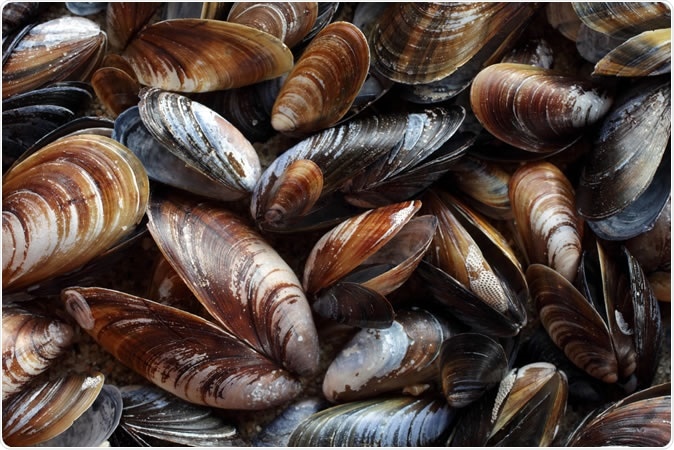
Contagious cancers in the oceans much more common than once thought
Researchers have found that a type of cancer affecting shellfish is spreading across the Atlantic Ocean and spilling into the Pacific Ocean as well. The study titled, “A single clonal lineage of transmissible cancer identified in two marine mussel species in South America and Europe,” is published this week in the latest issue of the journal eLife.
The team including Dr. Stephen Goff from Columbia University looked at the effects of the transmissible cancer among the shellfish colonies. This cancer is spread via water and this study reveals that the cancer could spread across thousands of miles of ocean. The team wrote that some cancers such as cervical cancer spread by Human Papilloma Virus (HPV) can be transmitted from one person to another. There are few other cancers that can be contagious. Some cancers can spread via microbes between Tasmanian devils, dogs and bivalve shellfish they wrote.
For this study the team looked at the pattern of spread of cancer in two species of mussels, the Chilean mussel (Mytilus chilensis) in South America and the Blue mussel (Mytilus edulis) in Europe”. They found that certain features of the cancer were seen in the mussels despite their geographical divide. The cancers in them arose, write the researchers, from a third species of mussel called the bay mussel or foolish mussel, Mytilus trossulus (M. Trossulus). The cancers seen in the first two species were identical in genetic makeup wrote the researchers. This reveals that “a single transmissible cancer lineage has crossed into two new host species and has been transferred across the Atlantic and Pacific Oceans and between the Northern and Southern hemispheres,” concluded the researchers.

Blue mussel (Mytilus edulis). Image Credit: Ingrid Maasik / Shutterstock
The team wrote that there is a life-threatening cancer that affects several species of bivalve shellfish. This cancer is found in M. trossulus mussels found in British Columbia, Canada, but the cancer is also noted elsewhere.
The team speculated that the cancer could spread across such geographical divides though “accidental transport of infected mussels on international shipping vessels”. They thus blame humans for unwittingly introducing a new disease among areas that were previously unaffected. This can also help scientists trace the movement of infections and diseases wrote the researchers.
The cancer in question here is a “hemic neoplasia” which is a “leukemia-like disease that has been found in more than a dozen marine species”, wrote the researchers. They added that this disease leads to loss of a significant population of mussels affected. They wrote that pollution and certain viruses have been suspected to be cause of this cancer among the mussel species. They investigated the cancer seen in M. chilensis from Argentina and Chile and compared it with the cancer in M. edulis from France and the Netherlands. Genetic markers showed that the cancer was similar in both species. The speculate that this lineage of the cancer started from “an M. trossulus individual, and it has since crossed into two different Mytilus species and is now affecting animals across both the Atlantic and Pacific Oceans and in both the Northern and Southern Hemispheres.” They wrote, “The gene trees of the four loci are all concordant with each other, and are all consistent with a clonal, asexual cancer lineage derived from an M. trossulus cancer that is independent from Mytilus BTN1.”
The authors of the study wrote that M. chilensis is closely related to M. Edulis and could be a subspecies of the former. This means that the jump from one of these to another could have been easier. On the other hand, M. trossulus is different from these two species. The second jump this was easier wrote the researchers.
The researchers assure that eating sea food does not entail risk of getting the cancer because the cancer cannot spread from the shellfish to humans via food. The study proves that certain cancers can be transmissible, and protection of marine life should be a priority. Goff said in an interview, “There are parallels between how cancers spread in the ocean and how cancer cells metastasize within humans. Learning more about contagious cancers in shellfish could help us find ways to prevent the metastatic spread of tumors to new sites in the body.” Thus, he brought the spread of these cancer geographically inter perspective of humans and metastatic cancer spread.
The team also explained that studies win Tasmanian devils and dogs between which cancer can spread could show that transmissible cancers could jump between species when there are inbred populations. This study however shows that even among highly outbred populations there is a risk of the cancers spreading and this time other species could be involved. Mitochondrial and genetic findings from this study are also eye openers for further research wrote the authors.
Journal reference:
A single clonal lineage of transmissible cancer identified in two marine mussel species in South America and Europe, eLife 2019;8:e47788 DOI: 10.7554/eLife.47788, https://elifesciences.org/articles/47788



































No hay comentarios:
Publicar un comentario